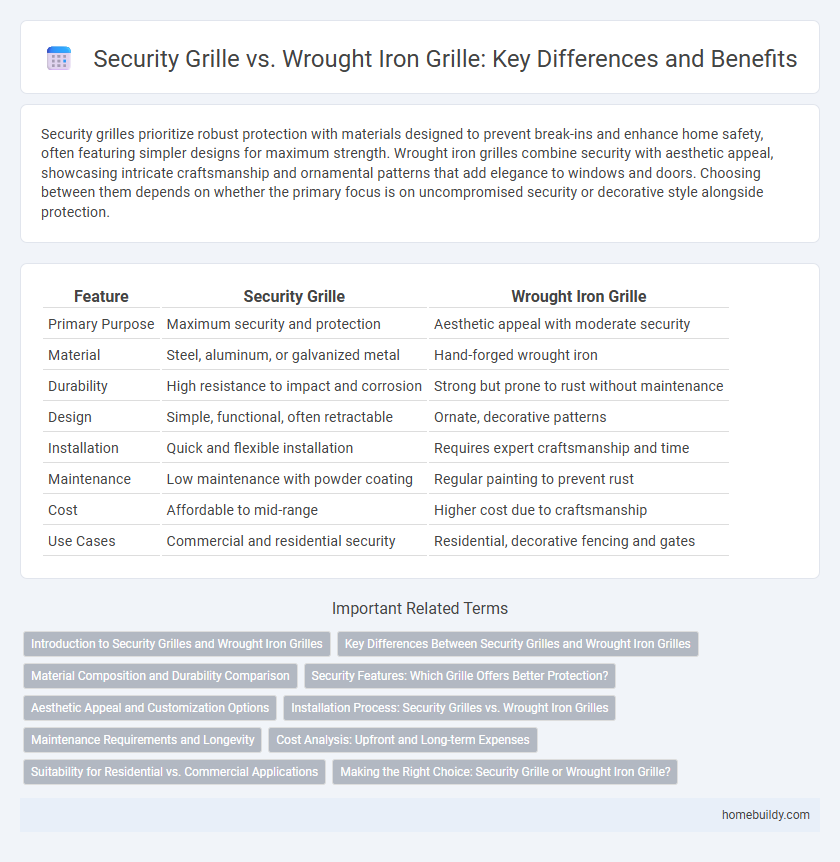Security grilles prioritize robust protection with materials designed to prevent break-ins and enhance home safety, often featuring simpler designs for maximum strength. Wrought iron grilles combine security with aesthetic appeal, showcasing intricate craftsmanship and ornamental patterns that add elegance to windows and doors. Choosing between them depends on whether the primary focus is on uncompromised security or decorative style alongside protection.
Table of Comparison
| Feature | Security Grille | Wrought Iron Grille |
|---|---|---|
| Primary Purpose | Maximum security and protection | Aesthetic appeal with moderate security |
| Material | Steel, aluminum, or galvanized metal | Hand-forged wrought iron |
| Durability | High resistance to impact and corrosion | Strong but prone to rust without maintenance |
| Design | Simple, functional, often retractable | Ornate, decorative patterns |
| Installation | Quick and flexible installation | Requires expert craftsmanship and time |
| Maintenance | Low maintenance with powder coating | Regular painting to prevent rust |
| Cost | Affordable to mid-range | Higher cost due to craftsmanship |
| Use Cases | Commercial and residential security | Residential, decorative fencing and gates |
Introduction to Security Grilles and Wrought Iron Grilles
Security grilles provide robust protection for windows and doors by combining strong materials with practical design, effectively preventing unauthorized access. Wrought iron grilles, known for their durability and intricate craftsmanship, offer both security and aesthetic appeal, often featuring decorative patterns that enhance property appearance. Choosing between security and wrought iron grilles depends on balancing functional safety needs with architectural style preferences.
Key Differences Between Security Grilles and Wrought Iron Grilles
Security grilles are designed primarily for robust protection and often feature a utilitarian design with materials like steel or aluminum, optimized for security and durability. Wrought iron grilles, on the other hand, emphasize aesthetic appeal with intricate, decorative patterns crafted from wrought iron, balancing security with ornamental value. The key differences lie in their material composition, design complexity, and primary purpose, where security grilles focus on maximum safety and wrought iron grilles combine security with architectural elegance.
Material Composition and Durability Comparison
Security grilles are typically made from galvanized steel or aluminum, offering high resistance to corrosion and impact, making them ideal for robust security needs. Wrought iron grilles, crafted from iron alloys with a higher carbon content, provide exceptional strength and a classic aesthetic but require regular maintenance to prevent rust. The durability of security grilles surpasses wrought iron in low-maintenance and weather resistance, while wrought iron excels in long-term structural integrity when properly cared for.
Security Features: Which Grille Offers Better Protection?
Security grilles are designed with reinforced steel bars and tamper-resistant fastenings, effectively preventing forced entry and providing robust protection against intruders. Wrought iron grilles offer aesthetic appeal with intricate designs but often feature thinner bars and ornamental gaps that can reduce their overall security effectiveness. For maximum security, reinforced steel security grilles generally provide superior resistance to cutting, prying, and impact compared to traditional wrought iron grilles.
Aesthetic Appeal and Customization Options
Security grilles offer a sleek, modern aesthetic with streamlined designs that enhance contemporary architectural styles, while wrought iron grilles provide a classic, ornate look characterized by intricate scrollwork and decorative patterns. Customization options for security grilles often include modular panels and a variety of finishes, enabling versatile installation and maintenance, whereas wrought iron grilles allow for highly detailed hand-forged designs tailored to individual architectural themes. Both types deliver strong security features, but the choice between them depends on desired visual impact and the level of artisanal customization required.
Installation Process: Security Grilles vs. Wrought Iron Grilles
Security grilles feature a straightforward installation process, typically involving surface mounting with screws or brackets, making them quicker and less labor-intensive to install compared to wrought iron grilles. Wrought iron grilles require specialized welding, precise measurements, and skilled craftsmanship, which increases installation time and complexity. The simpler mounting system of security grilles also allows for easier removal or replacement when needed, enhancing their practicality in various security applications.
Maintenance Requirements and Longevity
Security grilles typically require less maintenance than wrought iron grilles due to their corrosion-resistant materials like aluminum or galvanized steel, which eliminate frequent repainting or rust removal. Wrought iron grilles, while offering superior strength and aesthetic appeal, demand regular upkeep including sanding, priming, and painting to prevent rust and corrosion. The longevity of security grilles is enhanced by their low-maintenance coatings, whereas wrought iron grilles can last decades with diligent maintenance but are more susceptible to environmental damage without it.
Cost Analysis: Upfront and Long-term Expenses
Security grilles generally offer a more cost-effective solution compared to wrought iron grilles, with lower upfront expenses due to simpler manufacturing and installation processes. Wrought iron grilles, while pricier initially, provide durability and minimal maintenance costs over time, potentially reducing long-term expenses. Evaluating total cost of ownership, including repair, maintenance, and replacement frequency, is essential for making an informed decision between these two options.
Suitability for Residential vs. Commercial Applications
Security grilles offer versatile protection suited for both residential and commercial applications, providing customizable designs that enhance security without compromising visibility or ventilation. Wrought iron grilles, known for their durability and ornamental appeal, are more commonly preferred in residential settings where aesthetic value is prioritized alongside security. Commercial properties often favor security grilles due to their robust functionality and ease of maintenance, which align with the high-security demands of business environments.
Making the Right Choice: Security Grille or Wrought Iron Grille?
Security grilles offer robust protection with customizable designs prioritizing security and ventilation, while wrought iron grilles emphasize ornamental aesthetics and durability. Choosing between security grilles and wrought iron grilles depends on your primary need--maximum security and functionality or decorative enhancement with moderate protection. Consider installation environment, maintenance requirements, and budget to make an informed decision aligning with safety and style preferences.
Security grille vs Wrought iron grille Infographic

 homebuildy.com
homebuildy.com